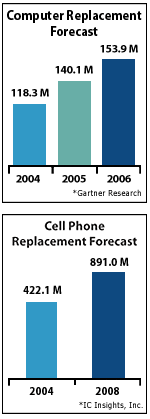|
 |
Discarded consumer electronics are an increasing challenge.
 Every day, informed consumers, community and business leaders, environmental organizations, and city, state and federal agencies grow more concerned about how to deal with electronic waste – or e-waste. Every day, informed consumers, community and business leaders, environmental organizations, and city, state and federal agencies grow more concerned about how to deal with electronic waste – or e-waste.
And for good reason:
- In the next three years, individuals and organizations worldwide will
replace more than 400 million computers.1
- The average cell phone in the U.S. is replaced after just 18 months.2
- More than 75 percent of all computers ever sold remain stockpiled
in our closets, garages, office storage rooms and warehouses.3
What does e-waste mean for the environment?
People are increasingly aware that computers, cell phones and other electronics contain chemicals such as cadmium, lead and mercury. Unless properly recycled, these chemicals could make their way from landfills into our soil, water and air. Many manufacturers are already reducing the amount of hazardous materials they use and are designing their products to make them even more recyclable. Many also offer recycling services free of charge or for a nominal fee. Manufacturers, federal, state and local governments and environmental groups are all working together to manage the e-waste issue. They need the support of everyone.
Why the Rethink Initiative?
Education
While most Americans know that electronics can be damaging to the environment if disposed of improperly, only a small minority (15 percent) are aware that electronics can be recycled where they live.4 eBay and other Rethink Initiative members offer a number of solutions that make it easier to responsibly deal with used computers, cell phones and electronics. The Rethink Initiative takes advantage of the power of the eBay platform to build awareness of these solutions among the millions of eBay users.
Reuse as well as recycling
By bringing millions of buyers and sellers together, the eBay marketplace enables reuse on a large scale. Reusing computers, cell phones and electronics extends their useful life. That maximizes their value before they’re finally recycled, and delays their entry into the waste stream–another advantage as more advanced recycling techniques are developed. Ready to take action? Learn more about how you can fight e-waste.
Notes:
- Gartner Research
- San Jose Mercury News
https://www.mercurynews.com/mld/siliconvalley/business/columnists/gmsv/10076409.htm?
- SVTC 2004 report / National Safety Council
https://www.svtc.org/cleancc/pubs/poisonpc2004.htm
- ACNielsen International Research, December 2004
|
 |
|
